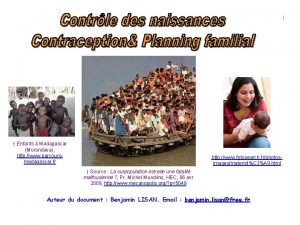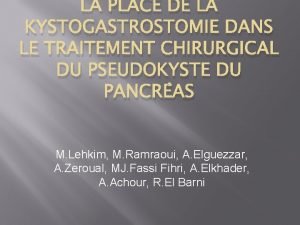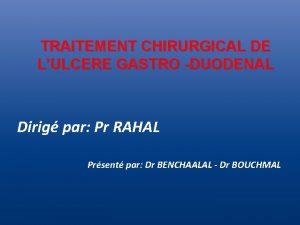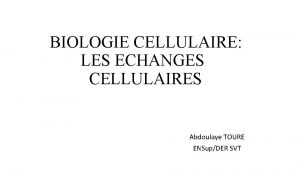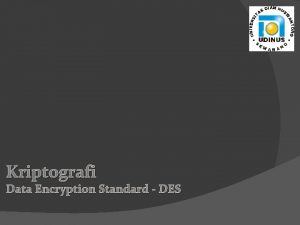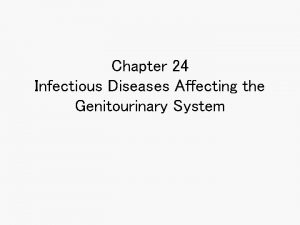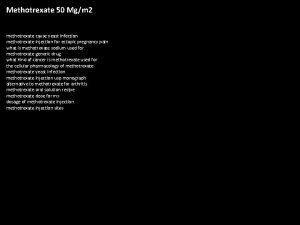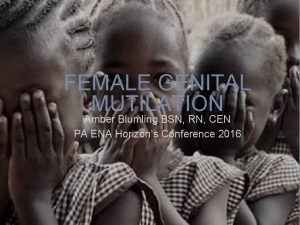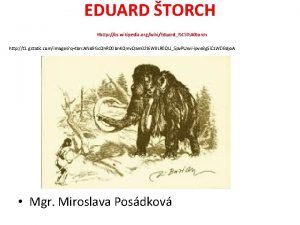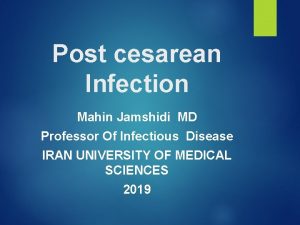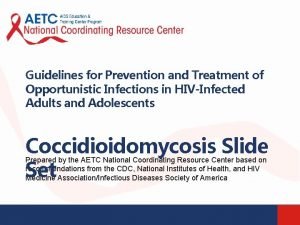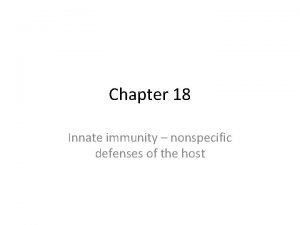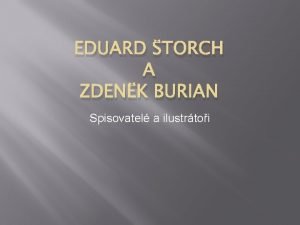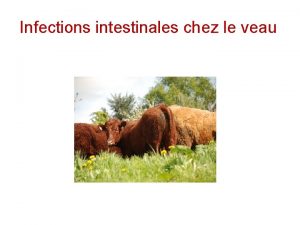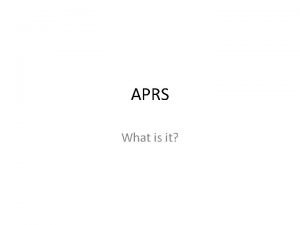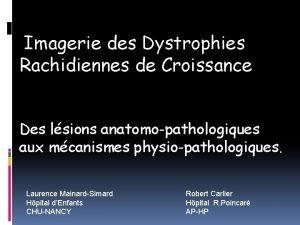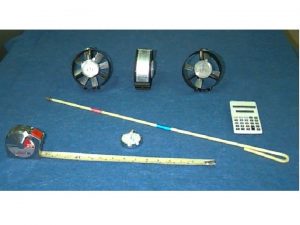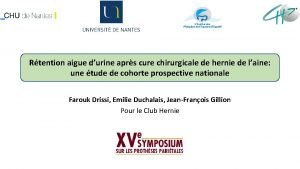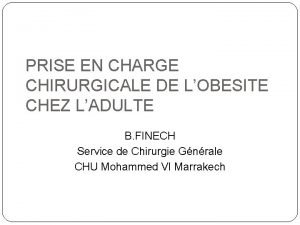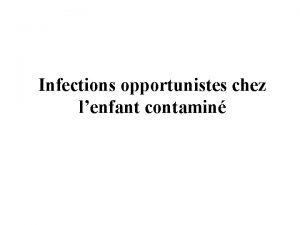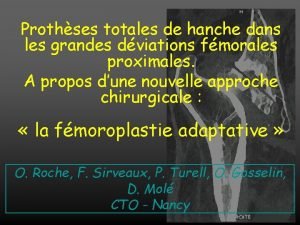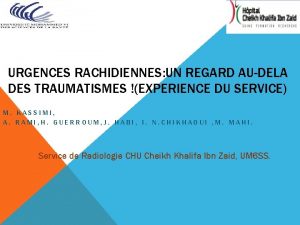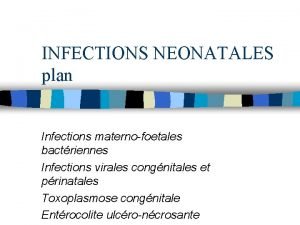Infections aprs correction chirurgicale des dviations rachidiennes chez















- Slides: 15

Infections après correction chirurgicale des déviations rachidiennes chez l’enfant « Plaidoyer pour une surveillance prolongée » Christian Morin et Amirouche Dahmam Institut Calot Berck Plage

Infections profondes 1089 interventions de 1983 à 2011 (suivi ≤ 1 an) 0. 8%

Infections profondes 1089 interventions de 1983 à 2011 (suivi ≤ 1 an) 0. 8% Guigui, RCO 2005, 2. 6% (3311 patients) Buchowski, Spine 2006, 2. 4% (2876 patients) Cahill, Spine 2010 , 4% (1543 patients)

Infections profondes 1089 interventions de 1983 à 2011 (suivi ≤ 1 an) 0. 8% même équipe no touch technic le bon air de Berck-Plage ?

Infections profondes 1089 interventions de 1983 à 2011 (suivi ≤ 1 an) 0. 8% même équipe no touch technic le bon air de Berck-Plage suivi ≤ 12 mois+++ ?

Infections profondes 1089 interventions de 1983 à 2011 • suivi ≤ 1 an 9 sepsis profonds (0. 8%) • suivi >1 an 25 sepsis profonds (2. 2%) 9 sepsis précoces (8 j-33 j) 16 sepsis tardifs (12 m-21 a 11)

Infections tardives 14 avec germes 4 Staph Aureus multi sensibles 2 E Coli 1 Entérocoque 3 Propionibacterium acnes 3 Staph. Epidermidis 1 Staph Capitis

Infections tardives • • • âge, ASA étiologie (Id, IMC, autre NM, autres) type déformation (Sc, hyper. C, hyper. L) type intervention (CF-CD, LFA, TSCut, FP, REV) niveau (sacrum? ) durée, saignement, transfusion, séjour rea type de matériel (titane/acier, lisse/diamant) type de greffe (in situ, banque, céramique) chirurgie à 1 ou 2 équipes

Infections tardives • • • TSCut (2 sur 13) CF-CD (14 sur 704) Acier / Titane Pointe diamant / Lisse p=0. 0002 p=0. 04 p=0. 01

• Adolescent idiopathic scoliosis (AIS) treated with arthrodesis and posterior titanium instrumentation: 8 to 12 years follow up without late infection (Mueller and al –Spine-2009) • Late postoperative infection following spinal instrumentation: stainless steel versus titanium implants. (Soultanis and al -Journal of surgical orthopaedic advances-2008) • Instrumentation loosening and material of implants as predisposal factors for late postoperative infections in operated idiopathic scoliosis. (Soultanis and al-Studies in health technology and informatics -2006) • Corrosion and late infection causing delayed paraparesis after spinal instrumentation. (Beguiristain and al-Journal of Pediatric Orthopaedics Part B-2006)

Infections tardives / précoces • • • douleur , fièvre, état général, écoulement, tuméfaction chiffre de leucocytes, % de neutrophiles, CRP, VS anomalie radio, scinti Tech ou Gallium, echo, Scaner, IRM type de germes ( classiques), « low growing » ) AMO, toilette +irrigation, toilette+drainage nbre jours antibiotiques évolution infection nécessité de réopérer du fait de l’infection évolution de la déviation rachidienne conservation matériel

Infections tardives / précoces + douleur p=0. 006, - écoulement p=0. 002 - fébriles p=0. 004 CRP moins élevée (70 / 170) p=0. 04 + de germes « low growing » p=0. 003 + AMO p=0. 0002 +guérison de l’infection sans ré opération p=0. 05

Infections tardives Pronostic après AMO 2 après AMO de TSC 4 après AMO de CF-CD

Sepsis 18 mois PO 3 ans post AMO

Discussion • Fréquence • Diagnostic bactériologique • Pronostic après AMO – infectieux – déviation rachidienne
 Rentrer chez dieu comme on rentre chez soi robert lebel
Rentrer chez dieu comme on rentre chez soi robert lebel Rentrer chez dieu comme on rentre chez soi
Rentrer chez dieu comme on rentre chez soi Hystéroscopie chirurgicale orleans
Hystéroscopie chirurgicale orleans Kystogastrostomie
Kystogastrostomie Pyloroplastie heineke-mikulicz
Pyloroplastie heineke-mikulicz Echanges des substances dissoutes
Echanges des substances dissoutes Des des des
Des des des Understanding the mirai botnet
Understanding the mirai botnet Eye infections
Eye infections Methotrexate and yeast infections
Methotrexate and yeast infections Genital infections
Genital infections Storch infections
Storch infections Postpartum infections
Postpartum infections Opportunistic infections
Opportunistic infections Nosocomial infections
Nosocomial infections Storch infections
Storch infections


